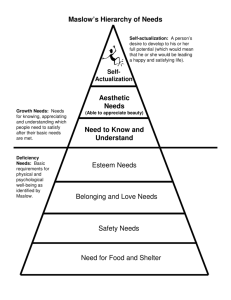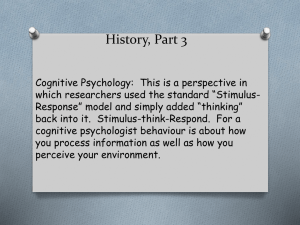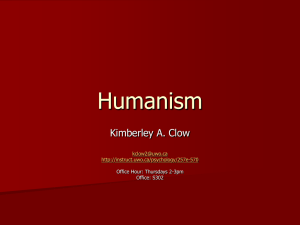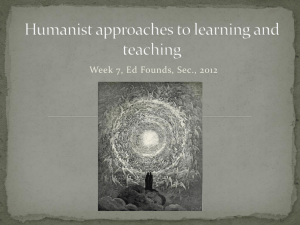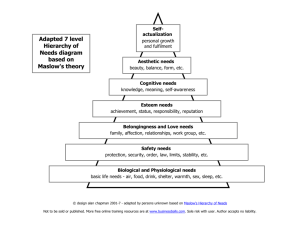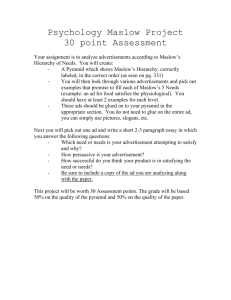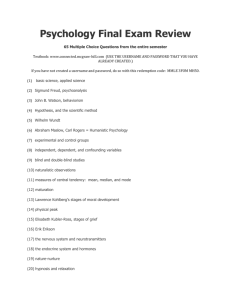Maslow (1970)
advertisement
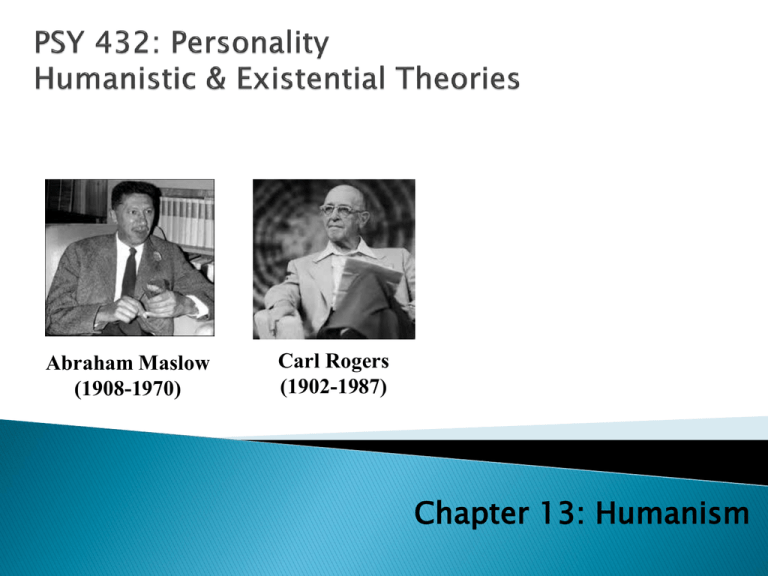
Abraham Maslow (1908-1970) Carl Rogers (1902-1987) Chapter 13: Humanism On Human Nature Believe in Free Will Emphasize the uniqueness of each individual Believe that humans strive for an upper level of capabilities See people as basically good Though it does not deny the effect of the environment, it sees human beings as able to transcend it to some degree Overall optimistic about humanity and the future Biographical Background Born in Brooklyn, NY Eldest of seven children His parents were uneducated Jewish immigrants from Russia Hoping for the best for their children – they pushed them hard towards education Only Jewish boy in neighborhood and target of antiSemitism He became very lonely as a youth and found his refuge in books Not close to either parent; fond of father but afraid of him; admitted he hated his schizophrenic mother Very close to uncle Biographical Background To satisfy his parents, he entered law school at CCNY and then Cornell University He married his first cousin and moved with her to Wisconsin where he became interested in psychology and gets his BA in 1930, MA in 1931, and Ph.D. in 1934 at the Univ. of Wisconsin In 1935, he returns to NYC and works with Thorndike at Columbia university and eventually begins teaching full-time at Brooklyn College and then becomes chair of psych department at Brandeis where he begins his crusade for humanistic psychology Maslow (1943, 1970) ◦ Proposed that there are five levels of motives, or needs, arranged in a hierarchy ◦ We must satisfy needs or motives low on the hierarchy before we are motivated to satisfy needs at the next level Physiological needs are basic, instinctual needs for air, food, water, and sex, among others ◦ These needs must be at least partially met in order to ascend the hierarchy ◦ These needs can also be arranged in their own hierarchy Safety needs include things such as shelter, security, and protection from physical and emotional harm. Also, considered as basic needs. These needs are met by having meaningful relationships, such as significant others, friends and children This level has two sublevels ◦ Low esteem needs are the needs for the respect of others – need for recognition, etc. ◦ High esteem needs are the needs for self respect –to achieve, to be competent, to be independent, etc. Deprivation Motivation (D-Motivation) Maslow considered the first four steps as needs that result form deficiencies in a person’s life Behaviors related to the first four categories are motivated by the deprivation of those things needed for full development Maslow (1970) Self actualization These people fulfill themselves and are doing the best they are capable of doing Becoming the most complete person that you can be – reaching your full potential Metamotivation Person is now motivated by a new set of needs; growth tendencies Being Needs (B-Motivation) Maslow (1970) Self-actualizers have 15 characteristics that are grouped under four key dimensions: Awareness See Table 13.1 on page 327 for full list Honesty Freedom Trust Maslow (1970) Maslow (1970) Peak Experience An intensification of any experience to the degree that there is a loss or transcendence of self An expansion of self but also a sense of unity and meaningfulness with in life Not all self-actualizers experience this See next slide Types of Self-Actualizers Transcenders (Peakers) ◦ Self-actualized individuals who experienced peak experiences Nontranscenders (Nonpeakers) ◦ Self-actualized individuals who had not experienced peak experiences Maslow (1970) Not perfect in several ways 1. Often have silly, wasteful, and thoughtless habits 2. Take too much pride in their accomplishments 3. Sometimes lose their tempers 4. Appear absentminded, humorless, or impolite 5. Their kindness allows them to be taken advantage of by others 6. Can appear ruthless and inconsiderate 7. Can be boring or irritating to others Maslow (1970) Failure to Self-Actualize 1. Tendency towards growth is weaker than the deficiency motives Many people can be stunted by poor environment or poor education 2. Western culture has put a negative emphasis on human motivation 3. Growth requires the taking of chances 4. People are afraid of their own abilities “Jonah Complex” Maslow (1970) Strengths Strong philosophical base; was not restricted by rigors of science Felt he was able to answer “beyond science” questions related to important human questions Ideas led to broader definition of science Optimistic view of humanity Significant value in clinical area Weaknesses Lacked rigor; problems with replication ◦ Maslow used case studies who for the most part were his friends or acquaintances Maslow’s hierarchy is too individualistic and male Maslow’s hierarchy is too simplistic in its portrayal of self-actualized person; too optimistic Vagueness in language and concepts; selfactualization is descriptive, not functional Biographical Background The son of prosperous businesspeople 4th of 6 children He was reared in a strict religious environment that placed great emphasis on the value of hard work, the sharing of responsibility, and education Strict upbringing led to Rogers being quite isolated as a youth but also very selfdisciplined Started school in the second grade as even before kindergarten he could read at this level Biographical Background A superior student, Rogers enrolled in the University of Wisconsin with the intention of studying agriculture; however, he soon decided to prepare for the ministry Leaving Wisconsin in 1924, he entered the Union Theological Seminary in New York He received his Ph.D. in psychology from Columbia University in 1931 and went to work at a guidance clinic in Rochester, New York Union Theological Seminary Biographical Background He later was professor at Ohio State University, University of Chicago, and University of Wisconsin, before settling at the Center for Studies of the Person in La Jolla, California Throughout his career, Rogers continued to work extensively with delinquent and underprivileged children, gathering the experience that led to his theory of nondirective or person-centered therapy Died in 1987 of heart attack The Phenomenology of the Individual The study of human awareness and perception No one knows you better than yourself Actualization The primary tendency of an organism is to maintain and enhance itself More likely to occur when the person is open and aware of all experiences Organismic Valuing Process is a key to actualization ◦ Subconscious process that guides us toward productive growth experiences ◦ Intuitive living The ability to accept information from all bases Experience is the highest authority If it feels right, it probably is Rogers (1964) The Self From interaction of the organism and the environment there gradually emerges a structure of self Interaction with significant others is of highest importance Self-concept is composed of conscious perceptions and values of who someone is; an object of perception Congruence When the self concept is in agreement with inherent potentialities and there are minimal conditions of worth Leads to openness to experience and a fully functioning person Incongruence One’s symbolized experiences do not match one’s actual experiences A lack of correspondence between the perceived self and the real self Can lead to maladjustment Rogers did not posit specific stages of personality development Concentrated on how the evaluations of others could influence self-actualization Rogers felt that the young child has two basic needs: 1. Need for Positive Regard ◦ The universal need for acceptance, love, and approval from others ◦ Particularly important during infancy 2. Need for Positive Self-Regard ◦ When acceptance and approval come from within the individual and forms part of the self-concept Unconditional Positive Regard Ideal situation leading to fully functioning self-actualized child The granting of love and approval regardless of individual's behavior Conditional Positive Regard The granting of love and approval only when behaving in accordance with parent's wishes, or when parents withdraw love if the child misbehaves Leads to Conditions of Worth ◦ The individual's belief that he/she is worthy of affection only when expressing desirable behaviors Openness to Experience ◦ opposite of defensiveness ◦ Is reflective and much emotional depth (for both pleasure and pain) Existential Living ◦ Living fully in each and every moment ◦ The absence of rigidity, is flexible, adaptable, and spontaneous Organismic Trusting ◦ Trust in one’s own experience; not bound by other’s opinions Experiential Freedom ◦ the freedom to choose among alternatives Creativity ◦ the ability to produce new and effective ideas and things Person-Centered Therapy ◦ Carl Rogers came to the conclusion that Freudian techniques did not work and that the less he tried to manipulate the therapy, the more likely was improvement in his patients ◦ Out of this experience he developed his notion of client-centered therapy ◦ He called it 'client-centered' because it is the intention that the patient should arrive at the insights rather than the therapist ◦ It is non-directive because the therapist does not try to direct the patient's attention to particular topics, such as early childhood experiences Attitudes Necessary for Therapeutic Change Rogers felt that there were three attitudes on the part of therapists that were necessary and sufficient for change Empathy ◦ The ability to experience another person’s feeling Acceptance ◦ Unconditional positive regard; no conditions of worth Genuineness ◦ Must be real; even if it means admitting shortcomings Click on pictures for videos Supportive vs. Reconstructive Psychotherapy Reconstructive ◦ Reorganize basic personality structure; remove defenses, etc. Supportive ◦ Seek to strengthen adaptive responses without tampering with basic personality structure Q-Sort Technique Research method used to study a patient’s viewpoint Based on the assumption the client knows oneself better than anyone else Stephenson (1953) Q-Sort Technique 100 cards containing descriptive statements or words Patient is asked to sort into categories according their self-perception; which ones describe them Gives a profile of the client; measures changes that occur throughout therapy Strengths Nice blend of philosophical ideas mixed with scientific method A welcomed positive alternative to the disease model Introspective self-reports have gained wider acceptance with social and cognitive behavior theorists who are now putting a greater emphasis on cognition Emphasis on human potentiality and freedom is attractive alternative to being controlled by environment or unconscious forces Rogerian therapy seems effective both for individual therapy and encounter groups (group therapy) Art of being a non-judgmental listener is now utilized by many practitioners Weaknesses Introspective reports are much more difficult to validate; overuse of self-reports Simplistic concept of phenomenology falls short in understanding complexity of the processes underlying human awareness View of development and self-actualization may not be relevant in non-western cultures where emphasis is not so much on the individual Critics say Rogers didn’t appreciate human capacity for evil Religion is not a science therefore should not be included in therapy Seligman & Csikszentmihalyi (2000) Feel that psychology had become dominated by attempts to treat disease and has not focused enough on nurturing healthy individuals to avoid disorders and to grow to their full potential Mihaly Csikszentmihalyi ( 80 years old) Martin Seligman (71 years old ) Seligman & Csikszentmihalyi (2000) Felt it is just as important to study healthy development as it is to study disease ◦ It is important to learn the processes that control positive growth so that it can be nurtured ◦ Much more can be learned about disorders if we understand how they differ from healthy development Seligman & Csikszentmihalyi (2000) Positive psychology focuses on: ◦ Research on experience related to contentment and satisfaction ◦ Understanding traits by identifying positive virtues for individual growth ◦ Studying institutions’ positive strengths to promote better communities Csikzentmihalyi (1990) Flow: the optimal state of intrinsic motivation Theoretical Criticism Positive Psychology has adopted many core principles without proper recognition of the roots of those ideas and have used a reductionist research methodology which is the opposite to the holistic approaches that humanistic psychology promotes Practical Criticism Positive Psychology is prescriptive when it should be descriptive Rather than trying to understand optimism and happiness, they tell us that we should be optimistic and happy A branch of psychology that studies the transcendent or spiritual dimensions of individuals Concerned with the states and processes in which people experience a greater connectedness with others, nature, and the “spiritual” dimension Higher mode of consciousness with transcends the ordinary self and ego Holistic; spirit, mind, and body approach Some slides prepared with the help of the following websites: ◦ http://webspace.ship.edu/cgboer/maslow.html ◦ www.socsci.uci.edu/~szhang/TA/personality/discussion5.ppt ◦ www.ccsr.ac.uk/methods/festival/programme/wita/.../stenner.p.. .
